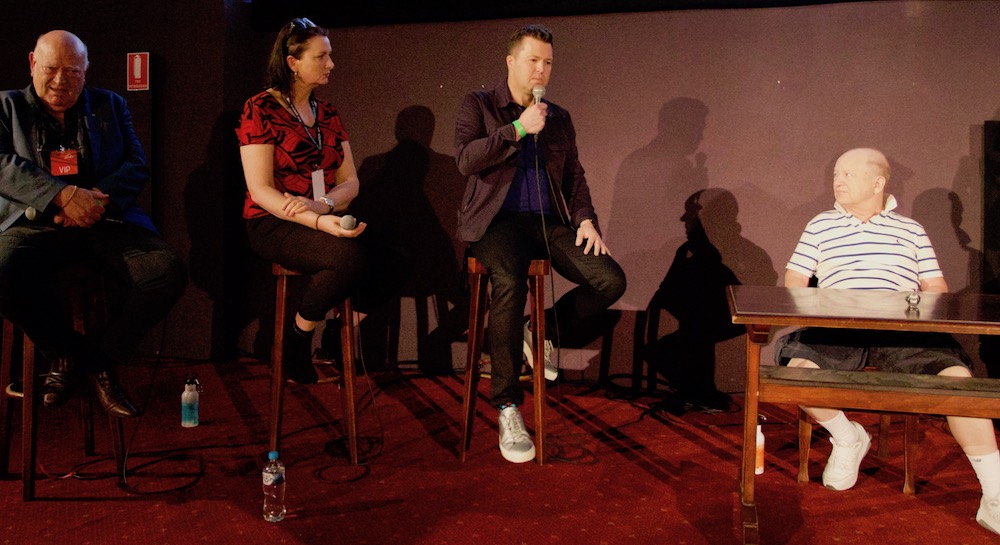‘You can’t rely on labels anymore’: Aus Music Week opens with gusto

With a vibrant panel of live music heavyweights, special guest music industry commentator Bob Lefsetz moderated a conversation on the current state of play in live music on the opening afternoon of the Australian Music Week conference.
Hot topics included the impact of ticketing fees on the artists and promoters and agents bottom line, exclusive vs non-exclusive ticketing arrangements, the growing role of promoters artist development and the use of data to drive business.
“What happens on the ground hasn’t changed much, but the way you sell tickets, the way you get to punters has changed. There’s a lot of competitors and multinational people paying to much for f*%kin acts and cutting ticket prices when they can’t sell the fuckin things,” said Michael Chugg.
Agent mentor Owen Orford (New World Artists) lamented the challenges faced by lock-out laws in Sydney while expressing his excitement about the opportunities in other parts of Australia.
“In some sense, Sydney has become a bit of a carpark because of lockout. There’s no night-time economy. It’s a tragedy. I’ve moved to South-east Queensland because it’s a growth area. There’s lots of opportunity.”
He said that companies profiting from booking fees, transaction fees, delivery fees and advertising on tickets themselves are negatively impacting on artist revenues while playing no part in artist development and investment.
“Everyone who has a slice of the pie is trying to increase their share, except they’re squeezing the margins for the artists. I’m not real happy about it.”

Photo: State of Play panel at 2019 Australian Music Week
Frontier Touring director Sahara Herald shared her assessment of the challenges acts playing in smaller venues at the grassroots level face.
“That’s where the nurturing and development starts. In most cases, without the building a profile and loyalty and creating what becomes a brand they can’t take the next step of taking the opportunity to work with a bigger promoter or to play in a larger venue. It’s a rare circumstance when an artist goes straight into that level,” she said.
Live Nation’s Roger Field noted that this conversation is one that hasn’t changed in 20 years.
“Part of the challenge the industry faces at large is that certain things are done a certain way because they’ve always it’s done that way… not necessarily because it’s right.”
However, Tim Worton did point out that compared to places like North America, the impact of these fees locally is less substantial. “It’s always been an issue for acts and promoters to deal with, but those fees are substantially higher on the other side of the world,” he said.
Frontier, Chugg and Live Nation have all started instigating longer-term localised development deals with artists, with both parties often taking a loss in the short term.
“You can’t rely on labels anymore when it comes to artist development,” said Field.
Chugg said that It’s still important to use all media outlets and to promote the artists outside of on-sale periods.
“It’s really frustrating when someone walks up to you and says ‘I didn’t know so-and-so was playing in Sydney.’ I missed out [on] going. They’re a fucking fan and they don’t know the acts in town. That’s happening a lot.”
“You just believe in the act and keep working.
“Some shows will sell out on databases. Country artist Luke Combs sold out in two minutes via our databases. We didn’t spend a dollar on marketing.”
“But the secret is… if you sell out in a minute, you should still keep promoting the act, so that you get to the people who missed out and want to come next time,” he said.
“Don’t let a sell-out become a best kept secret. There’s too much of that going on.”
Field continued saying, “Trying to understand our fans is increasingly important.”
“Everyone business has to do that and spend more money doing it. Being able to guide you costumers into taste making stuff they might like because they’ve been to certain shows is an important step we all need to take.”
“One truth has never changed in this business. You have to play live to build your audience,” he concluded.
The Australian Music Week conference continues today.






























